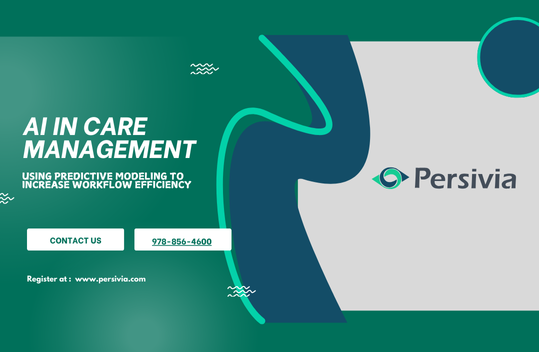AI in Care Management Using Predictive Modeling to Increase Workflow Efficiency
Reviewing patient data, organizing care, and reaching important choices take hours for healthcare teams. AI in Care Management changes this by processing patient information faster and more accurately than traditional methods. Recent data from Johns Hopkins Hospital shows that AI-powered systems help medical teams spot potential health issues sooner and respond more effectively. This direct impact on patient care makes AI an essential tool for modern healthcare organizations focused on delivering better results while managing costs.
Medical professionals across specialties report significant improvements in their daily workflows after implementing AI systems. These improvements translate directly to better patient care and more efficient use of healthcare resources. The integration of AI in care management programs has become particularly valuable for organizations transitioning to value-based care models, where efficiency and outcomes directly impact success.
Exploring AI in Healthcare
Healthcare providers now incorporate AI systems that analyze multiple data sources simultaneously, creating a comprehensive view of patient health. This technology processes information from:
- Electronic health records
- Medical imaging results
- Data from wearable devices
- Lab test results
- Patient communication records
The ability to process this vast amount of data quickly and accurately transforms how healthcare teams operate. AI systems work continuously in the background, analyzing patterns and highlighting important information that might otherwise take hours to discover.
Healthcare providers use this analysis to make better decisions and save valuable time. The impact on clinical decision-making has been substantial, with teams reporting more confident and faster decisions based on AI-supported analysis.
Make Better Decisions
- Spot health risks before they become serious
- Choose the most effective treatments
- Predict which patients might need extra attention
Save Time
- Automate paperwork
- Schedule appointments more efficiently
- Find important information quickly
Power of Prediction in Patient Care
Predictive modeling stands out as a key AI feature in care management programs. It processes patient data to forecast potential health issues and guide treatment decisions. Healthcare teams now use proactive rather than reactive care strategies, a radical change brought about by this technology.
Both operational efficiency and patient outcomes have improved significantly when predictive modeling has been used in healthcare settings. Healthcare teams can now identify potential complications days or even weeks before they become apparent through traditional monitoring methods.
Risk Management
- Identifies patients who might develop complications
- Predicts which patients are likely to need hospital care
- Shows which treatments work best for specific patient groups
Resource Planning
- Forecasts of busy periods in hospitals
- Helps schedule the right number of staff
- Manages medical supplies more effectively
Real Results From Real Hospital
The impact of AI-based care management becomes clear when examining specific implementations across different healthcare organizations.
Johns Hopkins Hospital demonstrated significant achievements:
- Fewer patients returning to hospital unexpectedly
- Better early intervention strategies
- More efficient use of hospital resources
These results highlight the practical benefits of AI-integrated care management, showing how technology can support and enhance medical expertise rather than replace it.
Making AI Work in Healthcare
The implementation of AI in healthcare settings presents unique challenges that organizations must address thoughtfully. Successful integration requires careful attention to both technical requirements and practical considerations.
Technical Needs:
- Keeping patient data private and secure
- Connecting AI systems with existing hospital software
- Training staff to use new technology effectively
Healthcare organizations have found success by addressing these challenges systematically. The most effective approaches focus on gradual implementation with clear communication at every step.
Practical Solutions:
- Using secure, encrypted systems for patient data
- Starting with small pilot programs
- Providing hands-on training for medical teams
Value-Based Care Programs and AI
The integration of AI in care management directly supports value-based care initiatives through improved efficiency and better outcomes. Healthcare organizations using AI-powered systems report significant improvements in their ability to meet quality metrics while controlling costs.
AI supports value based care programs by:
- Reducing unnecessary treatments through better prediction of patient needs
- Preventing medical complications with early intervention
- Improving overall patient outcomes through personalized care plans
- Lowering healthcare costs through more efficient resource use
Final Thoughts
Healthcare organizations ready to improve their care management can start with Persivia’s AI-powered platform. Our system helps medical teams:
- Spot patient risks early
- Make better treatment decisions
- Save time on administrative tasks
- Improve overall care quality
Unlike other solutions, Persivia’s platform integrates seamlessly with existing hospital systems and provides immediate benefits without disrupting current workflows.
Contact us to learn how our AI care management tools can help your organization deliver better patient care while reducing costs.




